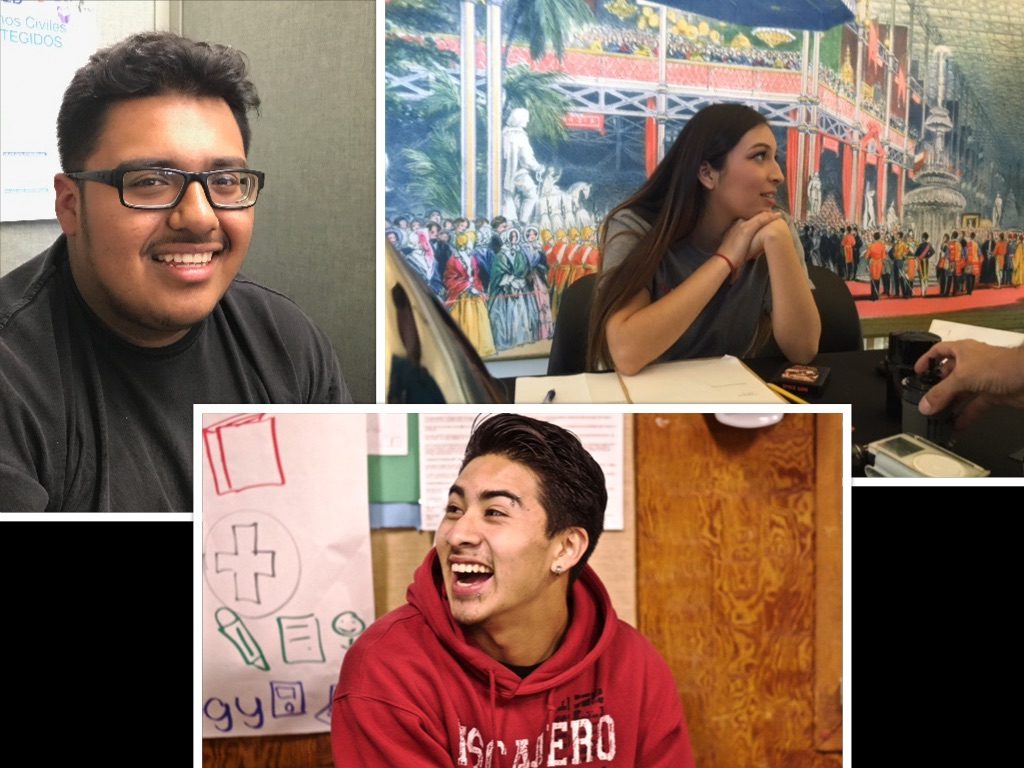
Isela Ponce in New York
The Puente Leadership Development and Employment Program is not just the most popular way for South Coast students to earn money doing cool summer internships, it’s the only way. Growing up in these rural enclaves, most students lack easy access to a car – a summertime must. That makes commuting to a job impossible. Puente has changed the equation, and increasingly, students are becoming worldlier as a result.
Take Isela Ponce, who studies international business at Cal State Pomona. Last summer, she pioneered a new Puente summer internship in the Marketing & Outreach Department at Cañada College, and earned rave reviews from her supervisor as she learned about the business side of running the community college’s public platforms.
Puente arranged for Ponce’s internship and transportation to and from Cañada College in Redwood City four days a week (as it does for all youth interns) along with two other Puente youth who worked in the college’s Upward Bound program.
Ponce learned a huge amount, especially about social media marketing, says Megan Rodriguez Antone, Director of Marketing, Communications & Public Relations at Cañada College.
“When the Marketing & Outreach Department held brainstorm sessions, Isela was incredibly involved and a part of the team so that she could get as much professional experience as possible,” says Rodriguez Antone.
Ponce handled every task with a smile. She helped the college plan its 50th anniversary celebration in 2018, by researching how other colleges have marked similar milestones. She kept the department’s Flickr account updated and blogged for the college website. Cañada is launching a mobile-friendly website, and Ponce offered feedback that helped the team craft an experience that catered to students. She also assisted Cañada’s International Student Center & Office of Student Life & Leadership Development in data collection.
“She was a force to be reckoned with, starting from Day One. She held high-level communication skills, and her enthusiasm was off the charts; she embraced every assignment with great excitement,” recalls Rodriguez Antone, who had such a positive experience that she is looking forward to welcoming another Puente youth intern this summer.
At its core, the Puente Youth Leadership Development and Employment Program is about helping youth find their passion and stay on track academically as they prepare for college (or prepare to finish college). The most popular part of the program, which gives local youth support from Puente staff year-round, are the summer internships. This summer, a record 48 youths applied.
“This year we’re blowing it out of the water,” says Lizeth Hernandez, Education Director for Puente. “We’re so excited.”
In the modern Bay Area, proximate to Silicon Valley and some of the best colleges and universities in America, Puente’s youth program participants are surrounded by unparalleled opportunities – but access is a major stumbling block. Puente’s Friday field trips – to universities, tech companies, and faraway neighborhoods like San Francisco’s Chinatown – are designed to give the rural students a taste of that outside world. And as the internship program evolves, Puente is working to match students with work opportunities that speak to their personal interests, which have grown more sophisticated and more specific.
Puente has connected students who have an interest in STEM (science, technology, math and engineering) with an internship at the Computer History Museum in Mountain View. A student who wanted to practice being a dental hygienist got to spend the summer in a dentist’s office. A student who wants to be a car mechanic got an internship in a garage.
“This year, one youth said he would really like to explore aerospace engineering, and that’s very specific. We have two youths who want to be pediatric nurses,” says Hernandez. “I want to align their internships with all of their interests, and that becomes a little bit more challenging.”
One of Puente’s oldest partnerships is with YMCA Camp Jones Gulch in La Honda. Four to six teenagers from Pescadero spend the summer working as camp counselors in a day camp program created just for Pescadero-based elementary school-aged children. It’s a demanding job that requires a lot of attention as kids hike, swim, do archery, make art, and ride the zip line.
The Puente interns have usually never been to summer camp themselves, and they often find the outdoor adventures as novel as the children. They also get to bond with resident staff – that is, the full-time counselors who come from all over the world and spend the summer running the sleep-away program at camp.
“It is a global community here… and all of a sudden, these Pescadero youth get to be a part of that,” says Jessi Prevost, Youth & Family Director at Camp Jones Gulch.
She remembers one young man from Puente who spent a whole week training alongside the resident staff of the camp, sleeping away from home for the first time, meeting other teens from countries on the other side of the world. It affected him profoundly, says Prevost.
“The kid had a smile stretched across his face. You couldn’t get rid of it. I remember him saying, ‘This is what I want to do. I want to be a resident camp staff.’
Puente is the only program where the nonprofit pays the interns’ salaries at Camp Jones Gulch. They get free access to all the facilities, free lunch, and a supervisor assigned to oversee the group. It’s a true partnership. And it’s gotten even better in recent years, because Puente youth are finding new opportunities at Camp Jones Gulch. Two young men who love cooking have come to work in the kitchen. “They hit it out of the park,” says Prevost.
And last summer, a Puente youth became the youngest-ever ropes course intern, at 16. It’s a special challenge because so much of the work has a psychological element – the job is to create a space where people can use teamwork to solve problems together. Sometimes that means stepping in to help, sometimes not.
“Being able to read people is important. Knowing when to offer words of encouragement, or when to step back. Having someone’s life in your hands. Those are some pretty intense life skills you’re learning,” Prevost says.
This summer won’t just be about work. Puente has some exciting field trips planned for its youth participants, including a kayaking adventure. Given the current political climate, Puente also decided to add civic engagement to the program. Students will spend a day volunteering in a refugee center.
“It’s really important for the youth to understand that even though they feel isolated here, an hour away you have different communities with their own challenges and obstacles,” says Hernandez.
Empathy, leadership, communication, maturity – these are qualities that will help students achieve their professional goals, no matter what they are.
We are grateful for the generous support of Kim and Philip Schiller, the Sobrato Family Foundation, Philanthropic Ventures Foundation, Sand Hill Foundation, the La Honda-Pescadero Unified School District, Wells Fargo and many individual donors who all support Puente’s Youth Leadership Development and Employment Program.
Do you have an internship opportunity that would provide a unique learning experience for South Coast youth? Please email Lizeth Hernandez.
The growth and impact of Puente’s Youth Employment and Leadership Programs is only possible thanks to the generous support of donors like you. Please consider donating to our Youth Program and help us continue to improve the quality of life for families on the South Coast. Donate here.

 El mes próximo, Paola Flores se graduará de la preparatoria de Pescadero con otros 31 compañeros y compañeras. Es un momento emocionante. Pero la emoción por la graduación también está cargada con estrés por lo que seguirá a continuación para muchos jóvenes, incluyendo a Flores. Las grandes incógnitas: la universidad y cómo pagarla.
El mes próximo, Paola Flores se graduará de la preparatoria de Pescadero con otros 31 compañeros y compañeras. Es un momento emocionante. Pero la emoción por la graduación también está cargada con estrés por lo que seguirá a continuación para muchos jóvenes, incluyendo a Flores. Las grandes incógnitas: la universidad y cómo pagarla.
